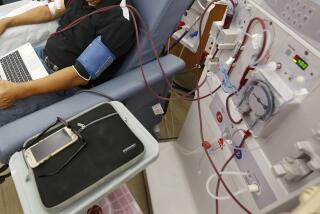Kidney Transplanted After Commercial Website Matchup
DENVER — Setting aside ethical concerns, surgeons completed a kidney transplant Wednesday in what is believed to be the first operation resulting from the donor and recipient meeting through a commercial website.
The donor and recipient were doing well after the four-hour surgery, Presbyterian/St. Luke’s Medical Center spokeswoman Stephanie Lewis said.
Bob Hickey, who lives in a mountain town near Vail, had needed a transplant since 1999 because of kidney disease but had grown tired of being on the national waiting list. He met donor Rob Smitty of Chattanooga, Tenn., through MatchingDonors.com, a for-profit website created in January to match donors and patients for a fee.
“Sitting on a waiting list and hoping for a new kidney for so long, your attention is attracted to anything that might help you,” Hickey, a 58-year-old former executive at a health maintenance organization, said a few hours before the operation.
The transplant had been scheduled for Monday, but doctors called it off at the last moment to look into whether either Hickey or Smitty stood to profit from the arrangement. Both men said no money changed hands for the organ, which would violate federal law.
Hickey paid the website $295 per month for three months. He is also expected to pick up about $5,000 in transportation costs and other expenses incurred by Smitty. Within three months of posting his profile on the site, he received 500 offers for donations.
Ethicists said they still have had serious concerns about MatchingDonors.com and organ donations between strangers.
There are no laws against soliciting an organ donation, and an increasing number of patients have turned to friends and family, or even casual acquaintances, for kidneys and pieces of liver.
By finding his own donor, Hickey bypassed the waiting list maintained by the United Network for Organ Sharing, or UNOS, the nonprofit group that works under government contract to allocate all organs donated from the dead. It doles out organs in part according to which patients need them the most.
The network does not oversee the increasing number of live donors, such as Smitty. Last year, there were 6,920 living donors and 6,457 dead ones.
University of Pennsylvania bioethicist Arthur Caplan said the first ethical issue raised by Internet donations was financial: Not everyone can afford to pay MatchingDonors.com’s fees or donor expenses.
“Those who are better off are going to have access to people as potential donors that the poor or the shy won’t have,” he said.
Caplan also said the website did not highlight potential hazards for donors. “Their job is to make these matches happen,” he said. “They’re not in the business of trying to discourage anyone or warn them.”
MatchingDonors.com, based in Canton, Mass., charges varying fees to post profiles of people looking for live organ donors. The company says all its profits go to maintain the site, and they have no problem waiving their fees.
“If people can’t afford it, we get them on it anyway,” said Dr. Jeremiah Lowney, medical director for MatchingDonors.com and a specialist in internal medicine.
UNOS came out against MatchingDonors.com in June, saying it “exploits vulnerable populations and subverts the equitable allocation of organs for transplantation.” UNOS spokesman Joel Newman said the network is concerned when anyone puts his or her need for an organ above others’ needs.
“An organ that becomes available with certain medical characteristics should be offered equally to the people that could benefit from it,” he said.
Typically, transplant patients find living donors on their own. Most living donors, though, are family, friends and others who have a personal connection to the patient.
Federal law prohibits the sale of organs, but it does allow payment for living donors’ expenses, such as time lost from work or airfare to the hospital.






